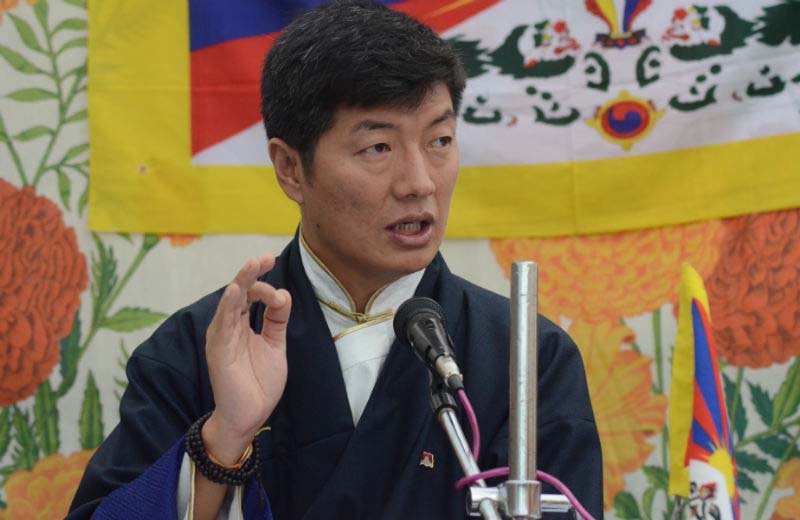 Bodh Gaya, India: The newly elected political leader of Tibet shares concerns that racial discrimination could be the reason for China's refusal of excersising its constitutional provision. At the request of more than a dozen foreign journalists, a press conference was organised by the exiled government on Thursday, january 5 and moderated by Ms. Dicki Chhoyang, minister of the information department and international relations.
Bodh Gaya, India: The newly elected political leader of Tibet shares concerns that racial discrimination could be the reason for China's refusal of excersising its constitutional provision. At the request of more than a dozen foreign journalists, a press conference was organised by the exiled government on Thursday, january 5 and moderated by Ms. Dicki Chhoyang, minister of the information department and international relations.
Kalon Tripa (political leader) of the Central Tibetan Administaion, Dr. Lobsang Sangay in a press conference at Bodh Gaya on January 5 stated that the Chinese government's refusal to grant autonomy to Tibet proves the different treatment of Tibetans over ethnic Chinese people.
In the press conference attended by over 100 journalists, the political leader of the Tibetan government-in-exile stated that the dialogue between the Tibetan and Chinese governments are 'not going well' owing to lack of reciprocation from the Chinese side.
Quoting the Chinese constitution, the 43-year-old Harvard law graduate said, "according to Article 31 of the Chinese constitution, one can start an administration region. Hong Kong's basic law was drafted in accordance with that provision."
"Constitutionally, there is provision to grant autonomy," he stated and said, "Despite that, when one raises a question about Tibet being granted genuine autonomy, the government is quick to respond stating the fact that Hong Kong already had a British commercial system and a rule of law so it was possible to grant them autonomy."
He also stated the fact that when Macau was granted autonomy it wasn't on the basis of pre-existing laws following which he questioned the race discrimination in the Chinese bureaucracy.
Making his point about there being no constitutional or institutional problem for China in granting autonomy to Tibet, he asked why Tibet wasn't granted autonomy when Hong Kong, Macau and Taiwan were granted the same.
"They are essentially telling the Tibetans that they cannot get autonomy because they aren't Chinese. There is no other reason for the Chinese to grant autonomy to Tibetans," he stated.
On being asked about the change in administration, the new Prime Minister stated that the his administration enjoyed both legacy and authority of the previous government along with change.
"I am not a monk. I haven't taken the vows and hence I enjoy fewer restrictions," he said. " We are the result of the efforts and contributions of the previous governments. There is definitely a generation difference in the administration but fact is, we enjoy both change as well as continuation of the previous administrators' efforts," he stressed.
Responding to a question on his relationship with Tibetans inside and outside Tibet, he said that they all accept and respect his administration.
"I have never been to Tibet, but the Tibetans who have come here from Tibet, know my name and greet me whenever they meet me on the streets," he said enthusastically.
Addressing the environmental issues inside Tibet, Dr. Sangay said"Both Indus river on which civilisations in India and Pakistan were based and the Yellow river on which China claims to base its civilization originate from Tibet."
"Nowadays, people have to buy water for drinking but we provide fresh water for free. Beijing has to recognise that," he said. He also stressed that Tibet being the primary source of water to most Asian countries, any change in Tibet's ecology will have an large scale effect on the populace.
"We are ready for negotiations anywhere, anytime if the Beijing government is willing," he said.
"We want to solve the Tibet issue peacefully. The Central Tibetan Administration hence stands for the middle way approach, i.e. Autonomy. We want an earnest dialogue with China," Dr. Sangay added.
Stating that fact that the Tibetan envoys have had 9 dialogues with China till 2010, he announced that the Tibetans are always open to a dialogue but there is a lack of reciprocation from the Chinese side.
The last round of the dialogue process which began in 2002 was held in January 2010.
Dr. Sangay is in Bodh Gaya for the 10-day of 32nd Kalachakra teachings for world peace by His Holiness the Dalai Lama of Tibet.
His visit also co-incides with the arrival and gathering of large number of Tibetans from across the globe and 8000 Tibetans from within Tibet in Bodh Gaya.
This 10-day event is set to conclude on 10th of January.


![Tibet has a rich history as a sovereign nation until the 1950s when it was invaded by China. [Photo: File]](/images/stories/Pics-2024/March/Tibet-Nation-1940s.jpg#joomlaImage://local-images/stories/Pics-2024/March/Tibet-Nation-1940s.jpg?width=1489&height=878)















